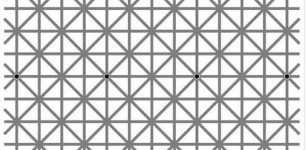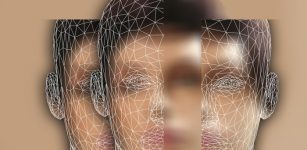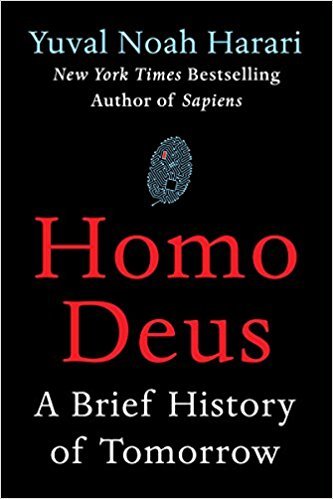Humans In Danger Of Being Replaced By Godlike ‘Homo Deus’ Soon – History Professor Warns
Cynthia McKanzie – MessageToEagle.com – What are the benefits and risks of artificial intelligence? Artificial intelligence can very beneficial to our society, but some experts express concern about the merge of humans with AIs. What happens when biotechnology and artificial intelligence merge, allowing us to re-design our species?
One historian warns that humans are in danger of being replaced by god-like ‘Homo Deus’.
Yuval Noah Harari is Professor of history at University of Jerusalem and author of the bestseller Homo Deus: A Brief History of Tomorrow.
Professor Harari thinks Homo sapiens, as we have known it for thousands of years, will cease to exist within a century or two. This is because we are using high-tech to upgrade ourselves into something different; something which is far more different from us than we are different from Neanderthals.
Breakthroughs in biotechnology, including gene-editing methods offers opportunity change our genes, our bodies, and perhaps our brains.
Such experiments can lead to unexpected and even unwanted changes in our society.
At the same time, scientists are developing brain-computer interfaces that will eventually will blur the line between man and machine.

Our technology dependence is increasing, even when it comes to simple tasks. For example, we use smartphones daily to make decisions.
Our ancestors used stone tools to shape their society thousands of years ago. Modern humans are more focused on making changes to their bodies.
We are entering a new and somewhat uncertain era, in which rather than using tools, the tools might be using us.
“People are delegating more responsibility to AI and they are already merging with their smartphones and their Facebook accounts,” Professor Harari said.
“These are no longer dumb tools like a hammer or a knife — they are intelligent entities that constantly study us, adapt to our unique personality, and actively shape our worldview and our innermost desires.”
In the future Harari envisions, we’ll gradually merge with machines thanks to biometric sensors and brain-computer interfaces.
See also:
Is Transhumanism Worth Striving For?
What Will Humans Look Like In The Future? Some Possible Scenarios
How Artificial Intelligence Will Bring Back Dead People To Life Within 30 Years
“Humans will merge with computers and machines to form cyborgs — part-organic, part-bionic life forms,” Professor Harari said. “You could surf the Internet with your mind; you could use bionic arms, legs, and eyes; you will augment your organic immune system with a bionic immune system, and you will delegate more and more decisions to algorithms that know you better than you know yourself.”
Soon we will be able to select “designer bodies,” as though shopping from a catalog, Professor Harari speculates.
“However, in the longer term — perhaps in the 22nd century — the human body is likely to lose its relevance and appeal,” he said. As our mastery over materials progresses, we may go “beyond material structures altogether. We might reach a point when minds could surf cyberspace directly, and adopt there any kind of form we fancy, irrespective of the laws of biology or even physics.”
Yuval Noah Harari, author of the critically-acclaimed New York Times bestseller and international phenomenon Sapiens, returns with an equally original, compelling, and provocative book, turning his focus toward humanity’s future, and our quest to upgrade humans into gods.
Over the past century humankind has managed to do the impossible and rein in famine, plague, and war. This may seem hard to accept, but, as Harari explains in his trademark style—thorough, yet riveting—famine, plague and war have been transformed from incomprehensible and uncontrollable forces of nature into manageable challenges. For the first time ever, more people die from eating too much than from eating too little; more people die from old age than from infectious diseases; and more people commit suicide than are killed by soldiers, terrorists and criminals put together. The average American is a thousand times more likely to die from binging at McDonalds than from being blown up by Al Qaeda.
What then will replace famine, plague, and war at the top of the human agenda? As the self-made gods of planet earth, what destinies will we set ourselves, and which quests will we undertake? Homo Deus explores the projects, dreams and nightmares that will shape the twenty-first century—from overcoming death to creating artificial life. It asks the fundamental questions: Where do we go from here? And how will we protect this fragile world from our own destructive powers? This is the next stage of evolution. This is Homo Deus.
With the same insight and clarity that made Sapiens an international hit and a New York Times bestseller, Harari maps out our future. Read more
“Today we have organic bodies, hence at any one time, we can be only in one place. But a future cyborg may have an organic brain connected via a brain-computer interface to numerous arms, legs, and other tools that could be scattered all over the world. Your brain could be in New York, while your hands will be fighting insurgents in Afghanistan or performing heart surgery in Egypt. So where are you?”

Should ‘Homo Deus’ be treated as human? The creature will be a new species of human, but he or she will not resemble us. Professor Harari believes these changes will come gradually as our relationship with the machines becomes slowly but inexorably more intimate.
Our species “is likely to upgrade itself step by step, merging with robots and computers in the process,” he wrote in his latest book, “until our descendants will look back and realize they are no longer the kind of animal that wrote the Bible, built the Great Wall of China, and laughed at Charlie Chaplin’s antics.”
Whether this development is good or bad is a matter of opinion, but everything indicates professor Harari gives a realistic view of the future.
Written by Cynthia McKanzie – MessageToEagle.com Staff Writer
Expand for referencesRelated Posts
-
 Ninio’s Extinction Illusion – You Can Never See All 12 Dots At Once
No Comments | Oct 26, 2018
Ninio’s Extinction Illusion – You Can Never See All 12 Dots At Once
No Comments | Oct 26, 2018 -
 BYU Team Makes Water Animation Much Easier – With A New Method
No Comments | Dec 6, 2019
BYU Team Makes Water Animation Much Easier – With A New Method
No Comments | Dec 6, 2019 -
 Legendary Ynglings: Descendants Of The Norse Gods And Oldest Scandinavian King Dynasty
No Comments | Mar 14, 2023
Legendary Ynglings: Descendants Of The Norse Gods And Oldest Scandinavian King Dynasty
No Comments | Mar 14, 2023 -
 The Bushido Code: Centuries-Old Unwritten Code For Ideal Samurai Warrior
No Comments | Dec 26, 2016
The Bushido Code: Centuries-Old Unwritten Code For Ideal Samurai Warrior
No Comments | Dec 26, 2016 -
 Humans Have Between 9 to 21 Senses In Total – Aristotle Was Wrong To Claim We Have Only Five Senses
No Comments | Feb 17, 2017
Humans Have Between 9 to 21 Senses In Total – Aristotle Was Wrong To Claim We Have Only Five Senses
No Comments | Feb 17, 2017 -
 OmniRing – Smart Miniature Device That Users Can Wear It All The Time
No Comments | Jun 3, 2023
OmniRing – Smart Miniature Device That Users Can Wear It All The Time
No Comments | Jun 3, 2023 -
 Why The World Needs A Better LED Light Bulb
No Comments | Nov 11, 2021
Why The World Needs A Better LED Light Bulb
No Comments | Nov 11, 2021 -
 Mysterious Ancient Ghost City Of Bhangarh And The Curse Of The Holy “Magician”
No Comments | Sep 22, 2015
Mysterious Ancient Ghost City Of Bhangarh And The Curse Of The Holy “Magician”
No Comments | Sep 22, 2015 -
 Genius Nikola Tesla Never Slept More Than 2 Hours A Day
No Comments | Apr 13, 2017
Genius Nikola Tesla Never Slept More Than 2 Hours A Day
No Comments | Apr 13, 2017 -
 Could A Huge Earthquake Sink A Whole Country?
No Comments | Jan 8, 2018
Could A Huge Earthquake Sink A Whole Country?
No Comments | Jan 8, 2018


